How to write a professional guard resume?
As a professional guard, you have essential duties that enable you to protect the security and safety of your clients. Whether you are working through an agency or as an individual contractor, obtaining a job as a guard can often come down to how well your resume reflects your skills and values.
In this guide, we will discuss everything you need to know about writing a professional resume as a guard. Keep reading to learn about:
- Selecting the best resume format for your experience level as a guard
- Writing a resume summary that inspires confidence and security
- Choosing key skills that reflect your abilities as a guard
- Including the proper details in your work experience section
- Concisely describing your educational and training credentials
Still looking for a job? These 100+ resources will tell you everything you need to get hired fast.
1. Select the best resume format for your experience level as a guard
The best and most commonly used resume format for guards is the reverse-chronological resume.
Your experience and work history matter when filling the role of a guard. A reverse-chronological resume focuses on exactly that: work experience. In this format, you will list your most recent position first and work backward from that point.
But what if you are new to the field and lack extensive work history?
Luckily, there are alternative resume formats to choose between. These include:
- Functional Resumes: A resume format that removes the focus on work experience, instead emphasizing education, skills, and unpaid experience. This format is often used by applicants who have recently completed school or training and are looking for an entry-level position.
- Hybrid Resumes: A hybrid format spreads the focus of the resume out between all sections as evenly as possible. This format is well-suited for professionals who are changing careers or who have large gaps in their employment histories.
2. Write a resume summary that inspires confidence and security
A resume summary is a brief statement that starts off your resume. In this summary, your primary goal should be to hook the attention of an employer with compelling details about yourself, your qualifications, and your experience.
Below we have provided an example of a weak resume summary, with a corrected example and explanation.
Incorrect guard professional summary example
Security guard with over 4 years of experience working in large stadiums and at major events. Background in both private security firms and government positions. Seeking a long-term position in a private business.
Why is this Incorrect?
When writing a resume summary as a security guard, you should strive to include eye-catching details that help you stand apart from competing applicants. This example does not offer any compelling insights into the guard’s specialization or certification, making it a weak example.
Corrected guard professional summary example
Driven Security Guard with 4+ years of experience in both large commercial venues and private business settings. Certified Armed Security Guard with additional certifications in Private Patrol and Emergency First Aid. Highly knowledgeable in the latest security equipment and technology.
Why is this Correct?
This example offers the reader a lot more examples and specific details that explain the applicant’s qualifications. Rather than being vague, the applicant names their exact certifications, as well as noting their additional area of expertise in security technology.
3. Choose key skills that reflect your abilities as a guard
When you begin selecting skills to include on your resume, keep in mind that skills have many roles to play in all sections of a resume. Besides a dedicated skills section, you should also work them into your work experience, resume summary, and even education.
For a guard, there are many technical and interpersonal skills required to be successful in the position. These include:
The best guard technical skills to put on your resume
- Basic security and fire inspection procedures
- Emergency planning and strategies
- Emergency first aid
- Surveillance
- Firearm safety
- Evacuation techniques
- Situation reporting
- Patrolling
- Camera systems
- Equipment inspections
The most effective interpersonal skills to put on your guard CV
- Alertness
- Spatial awareness
- Verbal and non-verbal communication
- Emotional intelligence and control
- Attention to detail
- Dependability
- Objective judgment
- Teamwork
- Delegation
- Active listening
4. Include the proper details in your work experience section
When you write your work experience section as a guard, you want to focus on your key responsibilities that involved heavy teamwork and leadership abilities.
By focusing on this type of experience, you show employers that you are not only independely capable, but also highly competent when working with large teams of people that require leadership, delegation, and direction.
Additionally, you should always provide quantifiable facts and figures to help add credibility to your resume. For instance, if you were a guard at a hospital, you should detail exactly how many rooms you were responsible for on a daily or nightly basis.
Here is an example of a work experience entry from a guard resume
Mercedes-Benz Stadium, Atlanta, GA
Lead Security Guard
January 2012 to March 2017
- Led a team of 500+ security staff personnel to monitor and address situations at major stadium events, including large sporting events and concerts.
- Monitored 30+ sections of seats on 3 levels, delegating surveillance tasks to small teams spread out in each section.
- Introduced a new training program to assist junior guards in de-escalations, resulting in a 10% decrease in banned or removed guests.
5. Concisely describe your educational and training credentials
When creating your education section as a guard, you will likely have additional training and certifications to list on your resume as well.
For certifications, you have two formatting options: either list them in the education section or give them their own dedicated section. Typically, if you have 3 or more relevant certifications to list on a resume, placing them in a separate section will help keep your resume from becoming visually cluttered.
Additionally, for both education and certification information, you should always include:
- The formal name of the degree or certificate
- The school, university, or certifying organization
- Expiration dates (when applicable)
Here is an example of a well-crafted education section on a guard resume
Education
Appalachian State University, Boone, NC
B.S. in Criminal Justice
2012-2016
- Minor: Hospitality Management
Guard certifications section example
Certifications
- Emergency First Aid — American Red Cross, Exp. 2023
- Certified Armed Guard — NC Department of Public Safety
- Firearms Trainer — NC Department of Public Safety

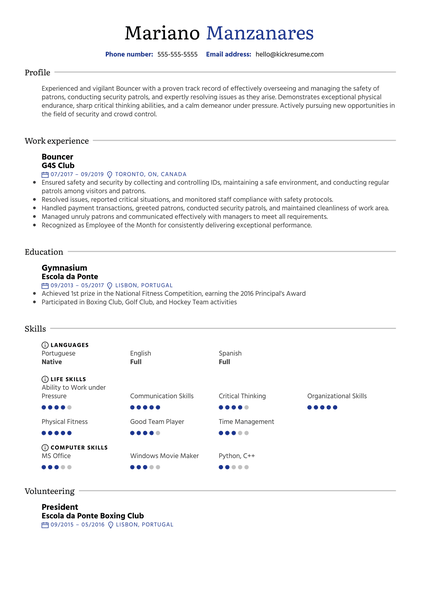
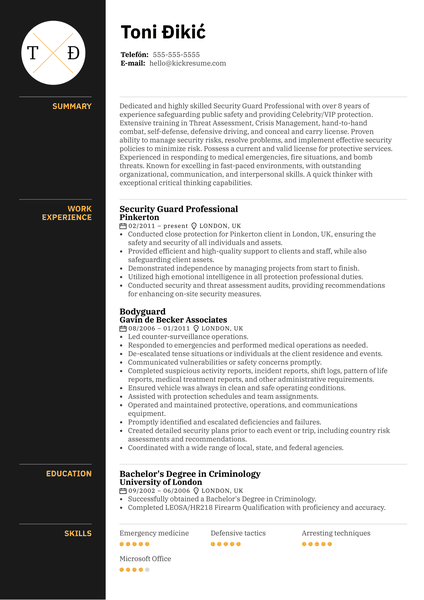
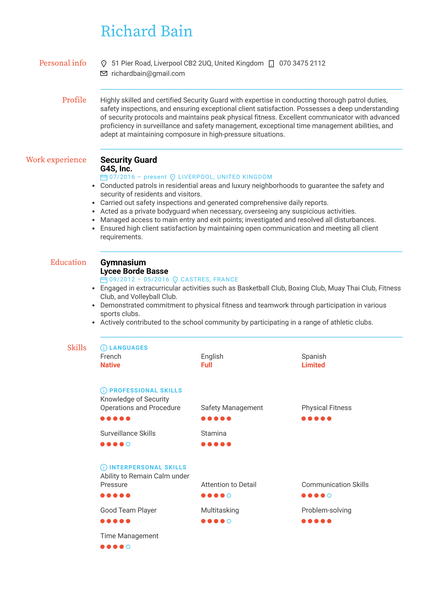


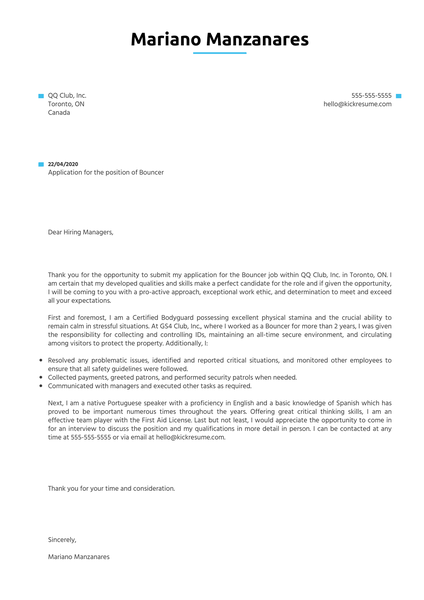
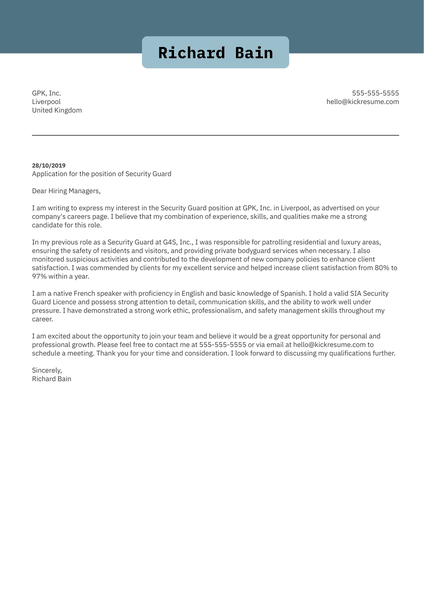
![How to Write a Professional Resume Summary? [+Examples]](https://d2xe0iugdha6pz.cloudfront.net/article-small-images/i-Profile.svg)
![How to Put Your Education on a Resume? [+Examples]](https://d2xe0iugdha6pz.cloudfront.net/article-small-images/i-Collage-Universities.svg)
![How to Describe Your Work Experience on a Resume? [+Examples]](https://d2xe0iugdha6pz.cloudfront.net/article-small-images/Experience.svg)


